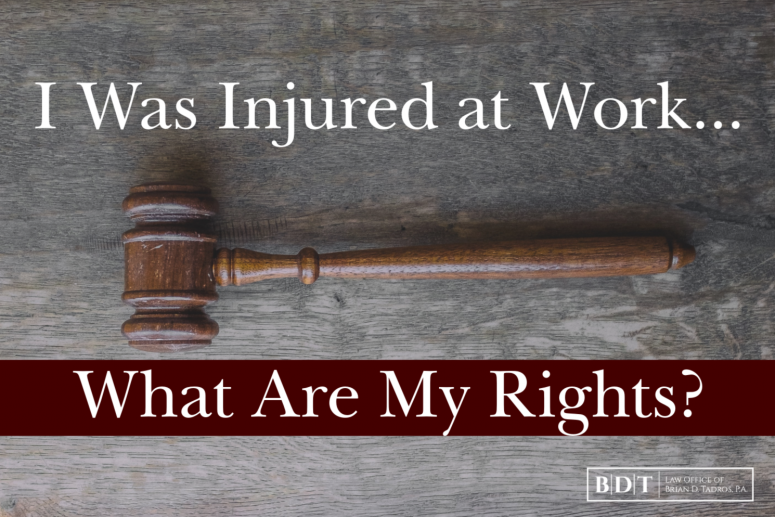
If you’ve suffered from a major injury or even something like carpal tunnel syndrome, you may be asking yourself, “I was injured at work, what are my rights?”
There’s a reason this question is so important.
The average payout for workers’ compensation claims ranges from $30,000 to $100,000. If you’re injured on the job and you don’t understand how to get what’s legally owed to you, you could miss out on the benefits you deserve.
Workers’ compensation laws generally vary from state to state. Following are the most important rights that injured workers have in the state of Florida.
1. The Right to File a Workers’ Compensation Claim
In most cases, when you’re injured on the job, you must inform your employer within 30 days. (Although, the earlier you do so, the better.) Once you report your injury, your employer must then file a report with their insurance company.
But just because your employer is supposed to do this, doesn’t mean that they will. If they refuse to do so, you have the right to report the injury directly to the insurer. In fact, even if you have a great relationship with your employer and trust them implicitly, it’s still a good idea to check with the insurance company to make sure the report was filed.
You can find your employer’s insurance company on the workers’ comp poster hanging at your workplace, typically in the breakroom or near the clock-in machine.
Injured at Work In Florida?
2. The Right to Receive Medical Treatment
After you report your injury, you have a right to receive proper medical care paid for by your employer’s workers’ compensation insurance. However, the insurance company is the one who gets to choose your authorized treating physician.
This does not apply to emergency medical care, however. If you have been seriously injured in a workplace accident and believe you need to go to the emergency room or urgent care clinic, you have the right to get medical attention immediately.
That said, the best practice is to advise your supervisor or someone in human resources that you need to seek emergency treatment and get their approval. If approval is not provided, you certainly have the right to seek this emergency treatment on your own but you should first try to get their approval anyway.
But what happens if you disagree with your treating physician? You also have the right to 1) switch your authorized treating physician or 2) seek the advice of an independent medical evaluator (IME). Each of these can only be performed once, so make sure you make these requests wisely.
If your requests for initial medical care are refused or ignored, you may seek reasonable treatment from the provider of your choice and request that they pay for it.
3. The Right to Recovery
If you’re lucky, your employer is solely concerned with your health and well-being. But even so, they’re likely hoping you’ll return to work as soon as possible. After all, every day spent at home or the doctor’s office is another day that your job isn’t getting done.
In the worst case scenario, your employer may even pressure you to ignore your doctor’s medical advice in order to get you back to work.
If you have filed a workers’ compensation claim, you have the right to a full recovery. Your employer might sign your paycheck and give you your job responsibilities, but they can’t dictate your recovery process. Always, always, always take your doctor’s advice regarding your workplace injury!
Returning to work too quickly after a work accident not only risks worsening your condition, it could threaten your workers’ comp benefits. Furthermore, it’s illegal for an employer to threaten you with termination or other forms of discipline for failing to return to work if you’re complying with the advice of your treating physician.
The law is on your side.
4. The Right to Appeal
Tied in to your right to recover from your injuries is your right to appeal your case if you think that the wrong decision was made by the Judge of Compensation Claims who decided your case.
Appeals are costly and complicated. If you think filing an appeal is the right decision for you, schedule a consultation with a qualified workers’ comp attorney who specializes in handling appeals.
5. The Right to Legal Representation
Last, but certainly not least, you have the right to hire an attorney to represent you every step along the way.
Even a relatively straightforward workers’ comp case can transform into something complicated and overwhelming. Slow recovery, medical complications, claim denials, and appeals are never out of the question, so it’s best to have an experienced workers’ compensation lawyer on your side right from the start. By hiring a workers’ comp attorney at the beginning of your case, you will have an advocate who is knowledgeable, not just in workers’ compensation law, but with your unique case.
For those who are concerned about affording workers’ comp lawyer fees, don’t worry! You will never have to pay out of pocket.
We Fight For Your Rights

When you’re injured on the job, you can end up feeling helpless and vulnerable.
Your employer and their workers’ comp insurance carrier will be looking out for their own interests. Who will help you look out for yours?
If you find yourself asking, “I was injured at work, what are my rights?” it’s important to know that you’re not alone. When you work with The Law Offices of Brian D. Tadros, you’re not just hiring a lawyer, you’re hiring an advocate and a counselor.
Contact us today to schedule your free initial consultation.



